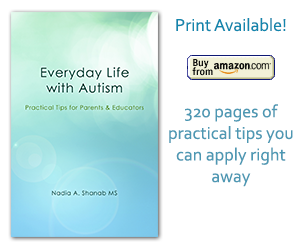By Nadia Shanab | autism
Source: Children’s Hospital& Research Center Oakland. “Researchers show that seotonin, oxytocin, and vasopressin, three brain hormones that affect social behavior related to autism, are all activated by vitamin D hormone. Supplementation with vitamin D and tryptophan would be a practical and affordable solution to help prevent autism and possibly ameliorate some symptoms of the disorder.”
Tags: autism, communication, health, research, social interaction, tips
Posted in autism | Comments Off on Low Level of Serotonin and Vitamin D Linked to Autism
By Nadia Shanab | Uncategorized
Facilitating social interaction for children with Autism Spectrum Disorder (ASD) is crucial to help them communicate and connect with the society. In schools, adults should encourage kids with autism to mingle with typically developed peers on the play ground. Luckily, all children enjoy recess and playtime, because it is simply a time to have fun!
Tags: autism, communication, parenting, peer effect, research, social interaction, socialization, tips
Posted in Uncategorized | Comments Off on Peer’s Effect on Children with Autism
By Nadia Shanab | Uncategorized
This is the time of the year when most of us tend to look back and try to “evaluate” or “assess” the last twelve months’ achievements. Parents, don’t be harsh on yourself and on your child, we’re human. Before you blame yourself for not meeting all the goals you’ve set a year ago, ask yourself
Tags: asperger's syndrome, autism, communication, consequences, diagnosis, discipline, early intervention, flexibility, health, independence, occupational therapy, organization, parenting, research, social interaction, tips
Posted in Uncategorized | Comments Off on End-of-Year Checklist
By Nadia Shanab | Uncategorized
Yesterday I ran into a former student accompanied by his family, mother, father, and sister in a shopping mall. His mom was the one who gave me a pat on the shoulder coming from behind me. She looked at me with a big smile and sparkling eyes, full of joy and excitement, wondering if I
Tags: autism, communication, discipline, early intervention, eye contact, flexibility, health, independence, parenting, schedule, social interaction, tips
Posted in Uncategorized | Comments Off on Success Story
By Nadia Shanab | Uncategorized
Tip Give your child the opportunity to play a musical instrument at an early age. Help your child explore and experience the practice of playing music and look for her favorite instrument. It may take time to land on the perfect instrument that matches your child’s interest and needs. Be patient don’t give up. Why
Tags: asperger's syndrome, autism, communication, discipline, flexibility, health, independence, occupational therapy, parenting, research, senses, sensory, social interaction, speech, tips
Posted in Uncategorized | Comments Off on The Benefits of Playing Music on The Brain
By Nadia Shanab | Uncategorized
I used to work with a student who was obsessively writing letters, numbers, and symbols in the air using her index. I was so puzzled about this behavior, because it didn’t look appropriate in other poeple’s eyes. My idea was to help her use another medium to write on that looked more appropriate and channel
Tags: autism, communication, memory deficiency, parenting, senses, social interaction, speech, tips, visual aids
Posted in Uncategorized | Comments Off on Anecdote: Memory Problem or Sensory Issue
By Nadia Shanab | Uncategorized
There are three other conditions/diseases that may overlap with autism. Your child has been diagnosed with autism, but beware of other symptoms that may hide under the ASD ambrella. Epilepsy, Tourette Syndrome, and Mitocondrial Disease. The good new is that treatments administered to cure these conditions can also benefit your child with autism. 1-Is your
Tags: asperger's syndrome, autism, diagnosis, early intervention, epilepsy, health, Mitchondrial disease, parenting, research, symptoms of autism, tips, Tourette Syndrome
Posted in Uncategorized | Comments Off on Beware of 3 Conditions Overlapping with Autism
By Nadia Shanab | Uncategorized
If you are expecting your child or students to consistently comply, obey, agree, and follow your directions every time you ask her, you must be dreaming. This is just so unrealistic. Whether your child/student is on the autism spectrum or not, it is unlikly that you’ll to be listened to all the time. Parents and
Tags: autism, communication, discipline, flexibility, independence, parenting, schedule, tips
Posted in Uncategorized | Comments Off on How to Deal with Oppositional Defiant Behavior
By Nadia Shanab | Uncategorized
“There’s no reason to miss out on holiday gatherings” Here are some tips to help parents of special needs kids to enjoy the holiday season and be part of their community and stay connected to their family and friends. Don’t turn down any invitations. You’ll be pleasantly surprised how interesting your experience was. Read the
Tags: ADHD, asperger's syndrome, autism, communication, flexibility, health, holidays, independence, organization, parenting, senses, sensory, social interaction, tips
Posted in Uncategorized | Comments Off on My New Article in The San Jose Mercury News This Week
By Nadia Shanab | Uncategorized
A study published in the journal Nature, Nov 6, reveals the earliest sign of developing auism ever observed: a steady decline in attention to others’ eyes within the first two to six months of life. Autism is usually diagnosed around the age of 2, when a significant delay in speech and poor social skills are
Tags: autism, communication, early intervention, eye contact, health, parenting, research, social interaction, tips
Posted in Uncategorized | Comments Off on Eye-Looking as An Early Marker for Autism

